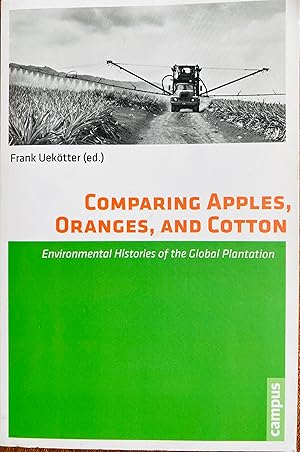Comparing Apples Oranges Cotton by Uekotter Frank (20 results)
Search filters
Product Type
- All Product Types
- Books (20)
- Magazines & Periodicals (No further results match this refinement)
- Comics (No further results match this refinement)
- Sheet Music (No further results match this refinement)
- Art, Prints & Posters (No further results match this refinement)
- Photographs (No further results match this refinement)
- Maps (No further results match this refinement)
- Manuscripts & Paper Collectibles (No further results match this refinement)
Condition Learn more
- New (15)
- As New, Fine or Near Fine (3)
- Very Good or Good (1)
- Fair or Poor (No further results match this refinement)
- As Described (1)
Binding
- All Bindings
- Hardcover (No further results match this refinement)
- Softcover (20)
Collectible Attributes
- First Edition (No further results match this refinement)
- Signed (No further results match this refinement)
- Dust Jacket (No further results match this refinement)
- Seller-Supplied Images (11)
- Not Print on Demand (20)
Language (2)
Free Shipping
Seller Location
Seller Rating
-
Comparing Apples, Oranges, and Cotton: Environmental Histories of the Global Plantation
Seller: HPB-Red, Dallas, TX, U.S.A.
paperback. Condition: Good. Connecting readers with great books since 1972! Used textbooks may not include companion materials such as access codes, etc. May have some wear or writing/highlighting. We ship orders daily and Customer Service is our top priority!
-
Comparing Apples, Oranges, and Cotton : Environmental Histories of the Global Plantation
Seller: GreatBookPrices, Columbia, MD, U.S.A.
Condition: New.
-
Comparing Apples, Oranges, and Cotton Format: Paperback
Published by University of Chicago press, 2014
ISBN 10: 3593500280 ISBN 13: 9783593500287
Language: English
Seller: INDOO, Avenel, NJ, U.S.A.
Condition: New. Brand New.
-
Comparing apples, oranges, and cotton : environmental histories of the plantation / Frank Uekötter (ed.)
Published by Frankfurt, M. ; New York, NY : Campus-Verl., 2014
ISBN 10: 3593500280 ISBN 13: 9783593500287
Language: English
Seller: Roland Antiquariat UG haftungsbeschränkt, Weinheim, Germany
Softcover. Auflage: 1. 272 S. : Ill., graph. Darst., Kt. ; 22 cm Neu und originalverschweißt! 9783593500287 Sprache: Englisch Gewicht in Gramm: 260.
-
PAP. Condition: New. New Book. Shipped from UK. Established seller since 2000.
-
Comparing Apples, Oranges, and Cotton : Environmental Histories of the Global Plantation
Seller: GreatBookPrices, Columbia, MD, U.S.A.
Condition: As New. Unread book in perfect condition.
-
PAP. Condition: New. New Book. Shipped from UK. Established seller since 2000.
-
Comparing Apples, Oranges, and Cotton
Seller: Kennys Bookshop and Art Galleries Ltd., Galway, GY, Ireland
Condition: New. Worldwide, plantations are key economic institutions of the modern era. This book includes essays on commodities as diverse as coffee, cotton, rubber, oranges, and tobacco, to offer an overview of plantation systems from Latin America to New Zealand that exposes the many dimensions of environmental history incorporated in these institutions. Editor(s): Uekotter, Frank. Num Pages: 272 pages, black & white illustrations, black & white tables. BIC Classification: HBTB; RN; TVK. Category: (G) General (US: Trade). Dimension: 142 x 215 x 23. Weight in Grams: 370. . 2014. Illustrated. paperback. . . . .
-
Paperback. Condition: New. Worldwide, plantations are key economic institutions of the modern era. From an environmental perspective, they are also the settings for some of the most powerful, consequential, and frequently destructive modes of production ever to have existed. This volume assembles essays on commodities as diverse as coffee, cotton, rubber, apples, oranges, and tobacco, to provide an overview of plantation systems from Latin America to New Zealand that exposes the many dimensions of environmental history incorporated in these robust institutions. The global history of plantation systems not only highlights the great institutional resilience of our modern monocultures, but also the price that humans and environments have paid for them.
-
Condition: New. pp. 272.
-
Condition: New. Worldwide, plantations are key economic institutions of the modern era. This book includes essays on commodities as diverse as coffee, cotton, rubber, oranges, and tobacco, to offer an overview of plantation systems from Latin America to New Zealand that exposes the many dimensions of environmental history incorporated in these institutions. Editor(s): Uekotter, Frank. Num Pages: 272 pages, black & white illustrations, black & white tables. BIC Classification: HBTB; RN; TVK. Category: (G) General (US: Trade). Dimension: 142 x 215 x 23. Weight in Grams: 370. . 2014. Illustrated. paperback. . . . . Books ship from the US and Ireland.
-
Comparing Apples, Oranges, and Cotton Environmental Histories of the Global Plantation
Seller: Revaluation Books, Exeter, United Kingdom
Paperback. Condition: Brand New. illustrated edition. 300 pages. 8.50x5.75x1.00 inches. In Stock.
-
Condition: New. pp. 272.
-
Comparing Apples, Oranges, and Cotton : Environmental Histories of the Global Plantation
Seller: GreatBookPricesUK, Woodford Green, United Kingdom
Condition: New.
-
Comparing Apples, Oranges, and Cotton : Environmental Histories of the Global Plantation
Seller: GreatBookPricesUK, Woodford Green, United Kingdom
Condition: As New. Unread book in perfect condition.
-
Kartoniert / Broschiert. Condition: New. Worldwide, plantations are key economic institutions of the modern era. This book includes essays on commodities as diverse as coffee, cotton, rubber, oranges, and tobacco, to offer an overview of plantation systems from Latin America to New Zealand that ex.
-
Comparing Apples, Oranges, and Cotton : Environmental Histories of the Global Plantation
Published by Campus Verlag Apr 2014, 2014
ISBN 10: 3593500280 ISBN 13: 9783593500287
Language: English
Seller: AHA-BUCH GmbH, Einbeck, Germany
Taschenbuch. Condition: Neu. Neuware - Plantagen sind eine Schlüsselinstitution der Moderne. Zugleich sind sie auch in ökologischer Hinsicht eines der folgenreichsten Produktionsregime überhaupt. Im globalen Ausgriff versammelt der Band Beiträge zu so unterschiedlichen Produkten wie Kaffee, Kautschuk, Baumwolle und Äpfeln. Dabei geht es gleichermaßen um Einblicke in unterschiedliche Plantagensysteme - von Lateinamerika bis Neuseeland - wie um exemplarische Einsichten in die vielfältigen Dimensionen der Umweltgeschichte der Plantage. Die Aufsätze dokumentieren die bemerkenswerte Beharrungskraft moderner Monokulturen - aber auch den Preis, den Menschen und Umwelten dafür zahlen müssen.
-
Comparing Apples, Oranges, and Cotton | Environmental Histories of the Global Plantation
Published by Campus Verlag in der Beltz Verlagsgruppe, 2014
ISBN 10: 3593500280 ISBN 13: 9783593500287
Language: English
Seller: preigu, Osnabrück, Germany
Taschenbuch. Condition: Neu. Comparing Apples, Oranges, and Cotton | Environmental Histories of the Global Plantation | Frank Uekötter | Taschenbuch | 272 S. | Deutsch | 2014 | Campus Verlag in der Beltz Verlagsgruppe | EAN 9783593500287 | Verantwortliche Person für die EU: Beltz Verlagsgruppe GmbH & Co. KG, Werderstr. 10, 69469 Weinheim, info[at]campus[dot]de | Anbieter: preigu.
-
.Comparing Apples, Oranges, and Cotton - Environmental Histories of the Global Plantation
Published by Campus Verlag, 2014
Seller: Bookworm, Tewkesbury, United Kingdom
Soft cover. Condition: Near Fine. Excellent condition.
-
Paperback. Condition: New. Worldwide, plantations are key economic institutions of the modern era. From an environmental perspective, they are also the settings for some of the most powerful, consequential, and frequently destructive modes of production ever to have existed. This volume assembles essays on commodities as diverse as coffee, cotton, rubber, apples, oranges, and tobacco, to provide an overview of plantation systems from Latin America to New Zealand that exposes the many dimensions of environmental history incorporated in these robust institutions. The global history of plantation systems not only highlights the great institutional resilience of our modern monocultures, but also the price that humans and environments have paid for them.













